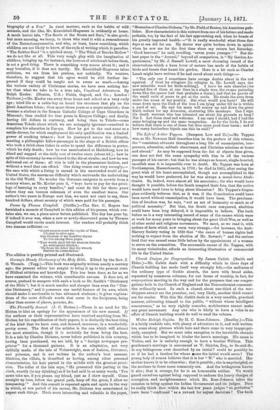The Piccadilly Annual. (J. C. Hotten.)—There is no need for
Mr. Rotten to hint an apology for the appearance of his new annual. If the authors or their representatives have received anything from Mr. Rotten for his republication of their papers, it is distinctly the best thing of the kind that we have seen, and cheesed, moreover, in a wonderfully pretty cover. The first of the articles is the one which will attract the most attention, though it is certainly far from being the best. It is a tale by Charles Dickens, never before published in this country, having been purchased, we are told, by a " foreign newspaper pro- prietor" for a thousand guineas. It is an adaptation, not very skilfully made, of the tale of Wainewright, man of fashion, littgrateur, and poisoner, and is not written in the author's best manner. Slinktou, the villain, is described as having, among other personal characteristics, his hair parted in the middle with the greatest preci- sion. The teller of the tale says, "He presented this parting to the clerk, exactly (to my thinking) as if he had said in so many words, You must take rae, if you please, my friend, just as I show myself. Come straight up here, follow the gravel path, keep off the grass, I allow no trespassing." And this conceit is repeated again and again in the way in which, at one period of his career, Mr. Dickens was accustomed to repeat snob things. Much more interesting and valuable is the paper, "Memories of Charles Dickens," by Mr. Field,of Boston, his American pub- lisher. How characteristic is this extract from one of his letters and made pathetic, too, by the fact of his fast approaching end, when he boasts of his greatly improved health: —" It is really wonderful what those fine days at sea did for me. My doctor was quite broken down in spirits when he saw me for the first time since my return last Saturday- ' Good heavens!' he said, recoiling, seven years younger !' " But the best paper in the "Annual," beyond all comparison, is "My Garden Ac- quaintance," by Mr. J. Russell Lowell, a most charming record of the observations which a keen lover of nature has made of the habits of birds and beasts that haunt his garden. Here is a bit such as Charles. Lamb might have written if he had cared about such things :— " The only one I sometimes have savage doubts about is the red squirrel. I think he oologizes [to otilog,ize is, Mr. Lowell says, the new scientific word for birds-nesting]. I know he eats cherries (we counted five of them at one time in a single tree, the stones pattering down like the sparse hail that preludes a storm), and that he gnaws off the small ends of pears to get at the seeds. He steals the corn from under the noses of my poultry. But what would you have ? He will come down upon the limb of the tree I am lying under till he is within a yard of me. He and his mate will scurry up and down the great black walnut for my diversion, chattering like monkeys. Can I sign his death warrant who has tolerated me about his grounds so long? Not I. Let them steal and welcome. I am sere I should, had I had the same bringing-up and the same temptation. As for the birds, I do not believe that there is one of them but does more good than harm ; and of how many featherless bipeds can this be said?"


































 Previous page
Previous page